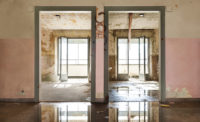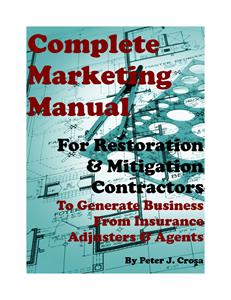Comfort Zones: 3 Areas that Matter for Restoration Contractors
It's important your customers are comfortable with you in their home

An old man is struck by a car and brought to the hospital. A nurse enters his room and says, "Sir, are you comfortable?" The old man replies, "I make a nice living."
If you want to make a nice living as a restoration contractor, then you need to make sure your customers are comfortable while you’re drying their home. (I know, weak segue but I liked the joke).
There are at least three comfort zones with which you should be concerned:
1. Comfortable with You
Have you ever toured a historic home? Perhaps the previous digs of a former president, author, or heroic figure? Those of us who are into history enjoy these, imagining life as it was when the house was occupied. The one frustrating aspect of these tours are the dreaded velvet ropes. Sometimes all they allow is a peek into a room from the hallway when what I really want to do is to walk everywhere, maybe poking my nose in drawers or closets so I could enjoy the total experience. But since the world is full of people who steal or get off by spray painting or carving their names upon even the most hallowed places, I understand the need to protect certain areas with ropes and locked display cabinets.
The thing is, all of us feel that way about where we live - you, your neighbors, customers, friends and family. None of us may be famous but our house is our castle, our inner sanctum, our refuge from the world, our home. It's been said that, "Home is where your stuff is". That's true, but we all know that it surpasses that. And if anyone ever treated it disrespectfully, we’d show them the door and advise them not to let the screen door hit 'em on the way out.
So when you and your techs enter the home of a customer who needs your help, do you think about that? You want to be respectful even on commercial jobs, but this is a private residence. This is someone’s HOME. And no matter how many times we walk in and out of it, it’s still someone’s HOME. If parts of the house are undamaged then we should put up mental velvet ropes and stay out of those areas. A homeowner's personal effects that we have to handle should be treated like our own or as if they had just been removed from a display case, regardless of actual monetary worth.
"Home is the nicest word there is." - Laura Ingalls Wilder
2. A Comfortable Environment
When it’s hot or cold outside and you need to have windows open or you’re going in and out a lot, do you make sure the drying area is sealed off as completely as possible from the rest of the house? Customers that are broiling or freezing to death make lousy referral prospects. So where occupants can’t be moved, it’s to your benefit - and theirs - to keep both them and your technicians comfortable throughout the drying process. While most people prefer their atmosphere to be around 70°, my aged father would rather the temperature be just under that of the surface of the sun. So have open communications with your customer to find out what works best for them. Not only will doing so increase customer and employee contentment, but happy occupants are less likely to throw a monkey wrench into your drying progress by turning off equipment.
3. A Comfortable Noise Level
Speaking of fooling with equipment, with all of the racket that restoration equipment makes, it’s no wonder that customers sometimes shut it off after you leave. As far as they’re concerned, there’s no such thing as being “comfortably numb”. In some situations there’s not much that can be done about it but use the lowest decibel rated equipment you have. In others, could you build a temporary insulated barrier(s) between the area being dried and the occupied space?
A lot of their comfort level can depend on what you tell them up front. Give them the worse case scenario and they’ll be happy when it doesn’t turn out to be nearly so bad. (“You’re a genius!”) Also let them know early on that any changes they make to your drying set-up will mean that it’ll take that much longer for you to finish. And nobody’s comfortable with that.
When you do the same type of job day in and day out it’s easy to get complacent. But in an industry where you get up-close and personal with your customers on a daily basis, it’s important to keep in mind their comfort and the sanctity of their home. They may have invited you into their home out of need, but no doubt many consider you a necessary evil and place you in a category just slightly above intruders. Yet if we’re mindful of their needs, treat their home like a museum and their belongings as priceless artifacts, that will go a long way toward raising their comfort level with us.
Looking for a reprint of this article?
From high-res PDFs to custom plaques, order your copy today!






